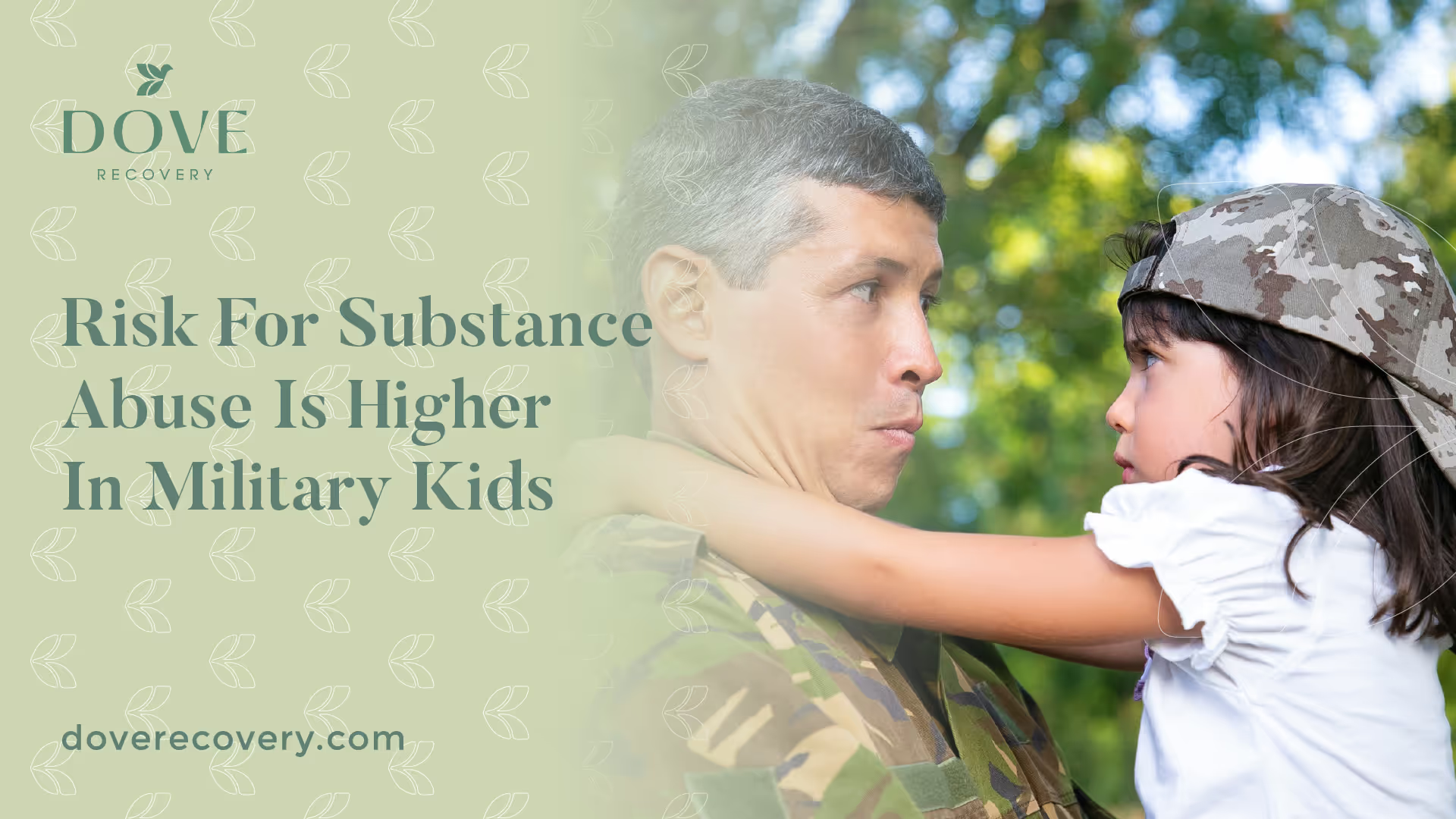Risk For Substance Abuse Is Higher In Military Kids

Substance Abuse in Military Kids
Addressing the issue of substance abuse requires a comprehensive understanding of the different demographics affected by it. One such group that requires particular attention is children from military families. Research consistently shows that the risk for substance abuse is higher in military kids.
Unique Stressors Impacting Military Kids
Children of military families face a unique set of stressors that can impact their mental and emotional wellbeing. According to the Substance Abuse and Mental Health Services Administration (SAMHSA), these stressors include parental deployment, frequent moves, and the anxiety of having a parent in a war zone. This heightened level of stress can, in turn, increase the risk for substance use and behavioral problems among these children.

The challenges military kids face can be exacerbated by disrupted living arrangements. When a parent is deployed, children may have to live with other relatives or in different environments, leading to instability and increased stress. This situation can further accentuate the risk of substance use.
Substance Use Rates Among Military Kids
The rates of substance use among military kids are alarming. A study published on PubMed (PubMed) found that rates of alcohol use, binge drinking, marijuana use, other illegal drug use, and prescription drug misuse are greater for children of currently or recently deployed parents than for children of parents who are not in the military.
Source: University of Iowa Psychiatry
The study also highlighted the effect of disrupted living arrangements on substance use. Children living with neither a parent nor a relative had a significantly higher risk of binge drinking and marijuana use. The highest risk was noted for children with a deployed parent and not living with a parent or relative, indicating the impact of living arrangements on substance use risk.
These findings underscore the need for targeted interventions and support to mitigate the risk of substance abuse among military kids. Understanding the unique challenges they face is key to developing effective prevention and treatment strategies.
Risk Factors for Substance Abuse
Understanding the risk factors that contribute to substance abuse among military kids is crucial for prevention efforts. This section will discuss the impact of deployment on children and the role of family dynamics in substance use risk.
Impact of Deployment on Children
Children of military families experience unique stressors that can increase their risk for substance abuse. One of the primary factors is parental deployment. The rates of alcohol use, binge drinking, marijuana use, other illegal drug use, and prescription drug misuse are greater for children of currently or recently deployed parents than for children of parents who are not in the military. This effect is consistent across 6th, 8th, and 11th grades, with disrupted living arrangements further accentuating increased substance use. (PubMed)
Research indicates that children of deployed military personnel should be considered at higher risk for substance use than children of non-military citizens. Rates of substance use were higher in youth who had experienced the deployment of a family member compared to those with non-deployed or civilian parents. (PubMed)
Family Dynamics and Substance Use Risk
Family dynamics, particularly those related to the military lifestyle, also play a vital role in the risk for substance abuse among military kids. For example, having a sibling in the military and experiencing sibling deployment was statistically significantly associated with substance use and depressive symptoms in children from military families. (PubMed)
This information underscores the need for targeted interventions and support for children in military families, particularly those experiencing the deployment of a parent or sibling. Understanding these risk factors and their impact on children's wellbeing is a necessary step in mitigating the risk for substance abuse in military kids. (SAMHSA)
Wellbeing of Military Connected Youth
The wellbeing of children connected to the military can be a complex issue, with several factors playing a role in their mental and physical health. Two such factors that stand out are the adjustment difficulties faced by these children and the impact of sibling deployment.
Adjustment Difficulties and Substance Use
Children from military families often face unique stressors that can lead to adjustment difficulties. These stressors, which include frequent relocations and the deployment of family members, can contribute to a higher risk for substance abuse and behavioral problems.
Research has indicated that the rates of substance use are higher in youth who have experienced the deployment of a family member compared to those with non-deployed or civilian parents [2]. The rates of alcohol use, binge drinking, marijuana use, other illegal drug use, and prescription drug misuse are greater for children of currently or recently deployed parents than for children of parents who are not in the military.
While military connected youth were not found to have poorer wellbeing than civilian children on the whole, those with deployed parents and older military connected children were at greater risk of some adjustment difficulties, including substance use and externalizing behavior.
Sibling Deployment and Substance Use
A less-explored area of concern is the impact of having a sibling in the military. Studies have shown that experiencing sibling deployment is statistically significantly associated with substance use and depressive symptoms in children from military families [2].
This underscores the need for comprehensive support systems that consider all aspects of military life, including the deployment of siblings. Addressing these unique factors can play a crucial role in reducing the risk for substance abuse in military kids.
In conclusion, while military connected youth may face increased risks for substance use due to unique stressors, targeted interventions and support can help mitigate these risks and promote healthier adjustment.
Substance Use in Veterans
Understanding substance use in veterans is crucial to appreciating the risk for substance abuse in military kids. The patterns of substance use in veterans and the associated mental health issues provide context and contribute to the overall problem.
Substance Use Patterns in Veterans
Veterans have been found to engage in significant substance use long after their military service ends. Alcohol is the most prevalent form of substance abuse, with 84.5% of those in active duty reporting its use. Additionally, tobacco use is also high, with 49.2% of military personnel using some form of tobacco or nicotine product in the past year. Furthermore, hard drug use, including misuse of prescription drugs, is present in 12% of military personnel.
Substance use prevalence remains consistent during active duty and post-separation, with alcohol use, cigarette use, and prescription drug misuse being endorsed at similar rates. However, marijuana use and hard drug use increase significantly in the 6-month period post-separation. Furthermore, comorbid use of different substances is common in veterans. For instance, heavy drinkers are almost 10 times more likely to use illicit drugs than nondrinkers [4].
Mental Health Issues in Veterans
The mental health of veterans also plays a significant role in substance use patterns. Emotional distress, including anxiety and depression, remains consistent from active duty to post-separation. However, feelings of isolation and military-based trauma symptoms increase significantly in the 6-month period post-separation.
In the studied population, the majority of veterans were found to experience emotional issues, substance use issues, and anger or irritability issues. These findings underscore the importance of addressing both substance use and mental health concerns in the veteran population as a step towards mitigating the risk for substance abuse in military kids. Understanding and addressing these issues is crucial not only for the wellbeing of veterans but also for the prevention of substance abuse in their children.
Children of Deployed Parents
The impact of military life extends beyond the service men and women, affecting their families, particularly their children. The unique stressors associated with military life place these children at a higher risk for substance abuse and behavioral problems [1].
Increased Risk for Alcohol and Drug Use
Studies have shown that children of currently or recently deployed parents have higher rates of alcohol use, binge drinking, marijuana use, other illegal drug use, and prescription drug misuse than their counterparts whose parents are not in the military. This effect is consistent across 6th, 8th, and 11th grades. As such, these children should be considered at higher risk for substance use than children of non-military citizens.
Furthermore, rates of substance use were found to be higher in youth who had experienced the deployment of a family member compared to those with non-deployed or civilian parents [2].
Impact of Disrupted Living Arrangements
The living arrangements of children with deployed parents are often disrupted, which can further accentuate the increased substance use. The stress and instability of having a parent deployed, combined with the necessity of moving or changing living environments, can lead to emotional distress and may drive these children to seek solace in substance use.
In fact, having a sibling in the military and experiencing sibling deployment was statistically significantly associated with substance use and depressive symptoms in children from military families [2]. This underscores the importance of providing adequate support and resources to mitigate the risk of substance abuse among children of deployed parents.
While the data underscores the elevated risk for substance abuse in military kids, it's essential to remember that each child's experience is unique. There are many factors that can influence a child's propensity towards substance use, including their coping mechanisms, support systems, and individual temperament. As such, interventions and preventative measures should be tailored to fit the specific needs of each child and family.
Preventative Measures
Decreasing the risk of substance abuse in military children is a multifaceted task that requires attention from different angles. Two important aspects of these preventative measures include the support that communities can provide and the role of military leaders.
Community Support for Military Families
One effective way to mitigate the risk of substance abuse in military kids is by providing more community support to families of deployed military personnel. According to a study by the University of Iowa Psychiatry, this includes the suggestion to place children with family members during deployment to minimize disruptions in living arrangements and potential substance use risks.
Additional community support could entail providing resources for mental health support, arranging social activities to foster a sense of belonging, and offering tutoring or academic help for children who may be struggling with schoolwork due to their parents' deployment. By ensuring that military children have a stable and nurturing environment, the community can play a significant role in reducing the risk of substance abuse.
Role of Military Leaders in Prevention
Military leaders also have a crucial role to play in preventing substance use disorders. They can help reduce the risk by ensuring clear policies exist to address alcohol and drug use among service members, establishing positive morale in units, and investing in programs that teach coping skills and increase resiliency among service members.
Military leaders can also help by promoting a culture that encourages seeking help for mental health issues. This can be done by normalizing discussions about mental health, providing resources for service members and their families, and ensuring that individuals who seek help are not stigmatized or penalized.
Moreover, the military can implement judicious screening for substance use disorders in service members using urine and blood tests, mental health evaluations, and avoiding mandatory random drug testing to prevent stigma and treatment avoidance [5].
By combining community support and proactive measures from military leaders, the risk for substance abuse in military kids can be significantly reduced. This multi-pronged approach can help ensure the wellbeing of military children and their families, fostering resilience in the face of the unique challenges they encounter.
References
[1]: https://www.samhsa.gov/smvf-ta-center
[2]: https://www.ncbi.nlm.nih.gov/pmc/articles/PMC6220523/
[3]: https://pubmed.ncbi.nlm.nih.gov/23441867/
[4]: https://academic.oup.com/milmed/article/183/5-6/e258/4840543
[5]: https://health.mil/Military-Health-Topics/Centers-of-Excellence/Psychological-Health-Center-of-Excellence/Clinicians-Corner-Blog/Preventing-Identifying-and-Treating-Substance-Use-Disorders-among-Service-Members
